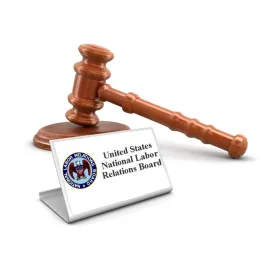We have been discussing arbitration agreements in the National Labor Relations Board (NLRB) context lately, particularly with respect to class action waivers. But employers may not be aware that earlier this summer, the NLRB issued an opinion holding that arbitration agreements that could be “reasonably construed” to prohibit an employee from filing unfair labor practice charges with the board are invalid under the National Labor Relations Act (NLRA). Prime Healthcare Paradise Valley, LLC 3368 NLRB No. 10 (June 18, 2019).
What is significant about this unanimous employee-friendly decision is that even if the language in your arbitration agreement does not expressly prohibit the filing of an NLRB charge (or accessing the Board or its processes), you may not be safe from a determination that your agreement is invalid. That is because most arbitration agreements contain general language mandating arbitration for “all claims or controversies for which a federal or state court would be authorized to grant relief,” and such language typically does not exclude NLRB charges. According to the recent opinion, such a clause violates the NLRA because it could be reasonably construed to prohibit employees from filing charges with the Board. It is also unclear from this decision whether a general savings clause, such as "nothing in this agreement is intended to interfere with employee's rights or violate the law” is sufficient to save an arbitration agreement.
Interestingly, while the employer in this case (Prime Healthcare) did not offer a justification for the scope of its arbitration agreement, the Board did not think that any legitimate justification was even possible. The Board explained, “[a]s a matter of law; there is not and cannot be any legitimate justification for provisions in an arbitration agreement or otherwise, that restricts an employee’s access to the Board or its process.”
Accordingly, the Board ordered rescission of the arbitration agreement (which the employer had already done).
In practical terms, this opinion meant that the agreement then needed to be replaced with one that specifically excluded NLRB charges from mandatory arbitration. The opinion also required notifying current and former employees who signed the agreement that it was no longer in effect.
As the Prime Healthcare decision clearly instructs, employers who use arbitration agreements should take the following steps:
-
Review your arbitration agreements and specifically carve out the filing of administrative charges, including ones with the NLRB;
-
Do not rely (for now) on a general savings clause to salvage the agreement;
-
Do not think that you may be able to argue a legitimate justification for including NLRB charges within the scope of the arbitrable claims, as the NLRB has said there is not a legitimate justification for doing so.
Finally, be sure to keep up with further developments in this area, as this decision by a Republican – controlled NLRB has been controversial and may not be the last word. But for now, compliance is required!




 />i
/>i

